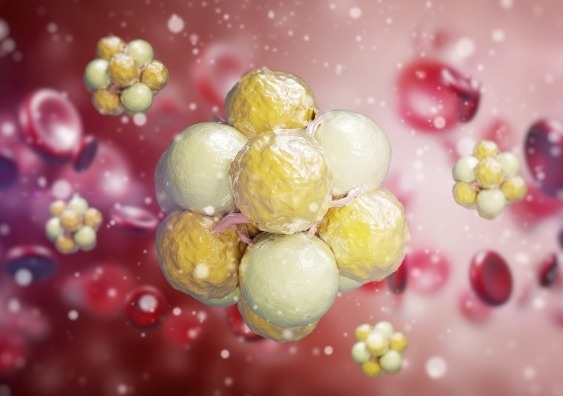Everyone must have heard about cholesterol and how important it is to eat heart-healthy meals to keep it under control. However, it might be surprising to learn that just roughly 20% of cholesterol comes from food. The rest is produced in the body, specifically the liver, intestines, and brain.
 Many auxiliary factors influence cholesterol production in mammalian cells. Image Credit: Shutterstock
Many auxiliary factors influence cholesterol production in mammalian cells. Image Credit: Shutterstock
In truth, cholesterol is essential for the human body’s growth and development. It is an essential precursor molecule and a vital building block for cell membranes. It is impossible to manufacture hormones like testosterone and estrogen without it.
The overall cholesterol production—or synthesis—pathway, along with the several functioning enzymes that power the process, are well understood by scientists. However, numerous other non-enzymatic elements influence the production process, which were previously disregarded.
UNSW Sydney researchers have uncovered a previously unknown protein that plays a supporting role in cholesterol synthesis. The study, published in the Journal of Lipid Research, demonstrates that the protein ERG28 aids in the organization of the molecular machinery required for cholesterol synthesis.
The role of this protein in cholesterol production was previously unknown. We now know it is one of many auxiliary factors influencing cholesterol production in mammalian cells.”
Isabelle Capell-Hattam, Study Lead Author and Research Assistant, University of New South Wales
Capell-Hattam and her colleagues from the School of Biotechnology & Biomolecular Sciences investigated cholesterol synthesis in human-derived cell lines lacking ERG28. They discovered that genetically engineered cells produced 60–80% less cholesterol than regular, healthy cells.
“When we got rid of the protein, we found there was around a 60–80 per cent reduction in how much cholesterol the cell can synthesize, so it’s a significant drop. So, while not essential, without ERG28, the cells struggle to produce cholesterol in an environment where they must synthesize it to survive,” stated Capell-Hattam.
The supporting cast of cholesterol balance
Enzymes are essential for fueling the human body’s metabolic functions, such as cholesterol synthesis. While many enzymes act independently, others work better by collaborating with other proteins to form larger, more efficient molecular machinery.
Capell-Hattam added, “Imagine you had a car without the chassis. It might still be able to work on its own, but it might not be as efficient with nothing to help hold it together.”
Many of these support proteins have previously been identified in the cells. However, for some, such as ERG28, their role in modifying cholesterol function has only been hypothesized based on the understanding of the yeast’s corresponding protein.
This is due to the fact that the process by which cholesterol is synthesized is very similar to the process by which yeast synthesize ergosterol, a component of fungal membranes that performs many of the same activities as cholesterol in animal cells.
“When you knock out ERG28 in yeast, they stop producing sterol, and you see the precursor accumulate. So, that is what we thought would happen in human cells,” further added Capell-Hattam.
However, it turns out that this is only partially true in humans. ERG28 appears to have more control over the cholesterol synthesis pathway than was previously observed in yeast research, according to the study.
Capell-Hattam stated, “Its functions seem to have expanded to control more elements of cholesterol synthesis in humans. Not only were our cells [without ERG28] struggling to produce cholesterol, but it appears to be impacting the transcription of the mRNA for cholesterol synthesis genes.”
A follow-up study is being planned by the research team to better analyze the role ERG28 plays in the metabolic pathway.
“It would also be very interesting to see what happens if researchers were to investigate what happens when ERG28 is knocked out in an animal model,” added Capell-Hattam.
Informing cholesterol management therapies and therapeutics
Even though this study is molecular in nature, understanding all the variables involved in the cholesterol manufacturing process and the several potential control points may lead to breakthroughs in health and disease management.
Lowering high blood cholesterol levels is critical for reducing the risk of heart disease. The statin class of drugs has been shown to be useful in treating heart disease by inhibiting a very early step in cholesterol formation. However, they are not without drawbacks.
Capell-Hattam remarked, “By studying the pathway for cholesterol production further, it’s possible we could find better cholesterol synthesis inhibitors.”
Variations in cholesterol production are also emerging as a cause of cancer progression. ERG28 was discovered to be overexpressed in several cancer cell lines in a prior investigation.
Capell-Hattam believes that inhibiting cholesterol synthesis in conjunction with chemotherapeutics could one day be a feasible treatment for delaying certain types of cancer.
“The more we understand how our bodies make and control cholesterol, the better it is from a health perspective,” Capell-Hattam concluded.
Source:
Journal reference:
Capell-Hattam, I. M., et al. (2022). The non-catalytic protein ERG28 has a functional role in cholesterol synthesis and is co-regulated transcriptionally. Journal of Lipid Research. doi.org/10.1016/j.jlr.2022.100295